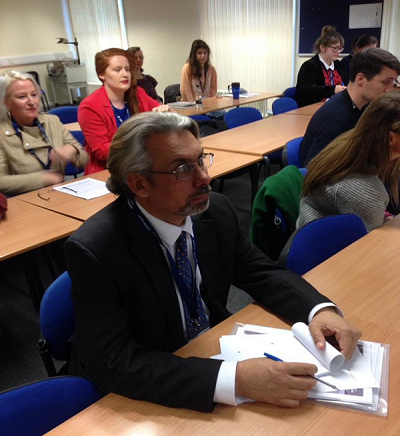
أ.م.د. مجيد محمد مضعن
Brexit and the New Trends in Contemporary British Theatre
بريكست والاتجاهات الجديدة في المسرح البريطاني المعاصر
Majeed Mohammed Midhin (PhD in English Literature)
University of Anbar/Iraq
majeed.mohammed@uoanbar.edu.iq
https://www.uoanbar.edu.iq/English/staff-page.php?ID=272
In his dream of seeing Europe as a utopian place, Jacques Derrida in A Europe of Hope said:
[…] without Eurocentric illusions and pretensions, without the slightest pro-Europe an nationalism, without even much trust in Europe as it is or in the direction it is taking, we must fight for what this name represents today, with the memory of the Enlightenment, of course, but also with a guilty conscience for and a responsible awareness of the totalitarian, genocidal, and colonialist crimes of the past. Thus, we must fight for what of Europe remains irreplaceable for the world to come, for it to become more than a market or a single currency, more than a neo-nationalist conglomerate, more than a new armed force.1
Derrida’s dream of Europe seems died with the UK Referendum. However, as an outsider who lives outside Europe and as a PhD student who spent four years here in the UK, I understand the concerns of British people towards Brexit. Both, whether those who voted for Remain or Leave have their own reasons which can be justified. At the same time, it is too early to evaluate the result of the UK Referendumwhich took place on 23 June 2016 before going into effect. For me, at least, the result is not “a triumph of the irrational over reason,”2 as Aleks Sierz said. In a similar way, it is not a surprise. On the contrary, the result of the Referendumis expected.
Looking back to the bad situation of some British communities which is abandoned by Thatcherism and the march of neo-liberalism, for example, we understand the motives behind such decision.
I think one of the main reasons behind voting to leave was the fact that membership of the EU means the free movement of people, migrants. This is a serious problem which should be taken into consideration not only on the economic, political, cultural and social level but also on the religious level on the long term. Unconsciously, young people used to imitate. This kind of imitation or infection of the new comers may affect the texture of British society in one way or another. Consequently, the society will be converted into another religion. This fact is clearly manifested in a number of plays, written before and after the Referendum. For example, John Hollingworth’s Multitudes (Tricycle Theatre, 2015) tackles the conversion of white women to Islam. The issue of immigrants also find expression in the theatrical writings after Referendum. Stephen Laughton’s Screens (Theatre 503, 2016) has an incident in which a Turkish mother is abused because she is mistaken for a Syrian refugee. Likewise, Stef Smith’s Human Animals (Royal Court, 2016) dramatizes the danger and threat of the new wave of migrants on European society. Characterizing them “as swarming or pouring across Europe,”3 reveals Smith’s concerns and skeptical of the new comers. In his comment on this play, Aleks Sierz argued that “the use of key words like ‘incineration’ suggests the Holocaust and ethnic cleansing”.4
In contrast to Rufus Norris, the artistic director of the National Theatre, called the Brexit vote a “wake-up call,” and warned that “the arts in general have become out of touch with some parts of the country”.5
What is unique feature of British theatre is its immediate response to vital issues of the world. So, it has reacted to Brexit with a range of emotions which reflected divided opinions among people. This division represents a healthy state of this theatre. Since the birth of the state-of-the-nation tradition, British theatre has dealt with local issues closely related to the nation. As mentioned before, this focus on these issues by theatre makers can be justified because of the multiple threats that have faced the nation such as immigration, multiculturalism, and national identity. All these provocations have had their impact on the type of the plats presented on British stages.
Though British theatre is known for its plurality, it is noted that most theatres in the UK do not stage contemporary European plays as before. Accordingly, looking closely at the British theatre today, we see the marginalization of European plays in the programmes of major theatres. This phenomenon can be clearly seen after the heated argument over Brexit.
Keywords: Brexit1, Europe2, Referendum3, Thatcherism4, State of the Nation Plays5
1-Jacques Derrida, “A Europe of Hope”, Epoche, Volume, 10, Issue 2 (Spring 2006): 407-412.
2-Aleks Sierz, “Dark Times: British Theatre after Brexit,” PAJ: A Journal of Performance and Art, Volume 39, Number 1, Januray 2017: 3-11.
3-Alexs Sierz, “British Theatre after Brexit: One Year on”, PAJ: A Journal of Performance and Art, Volume 40, Number 3, September 2018: 60-70.
4- Aleks Sierz, “Dark Times: British Theatre after Brexit,” p. 4.
5-Ibid.




